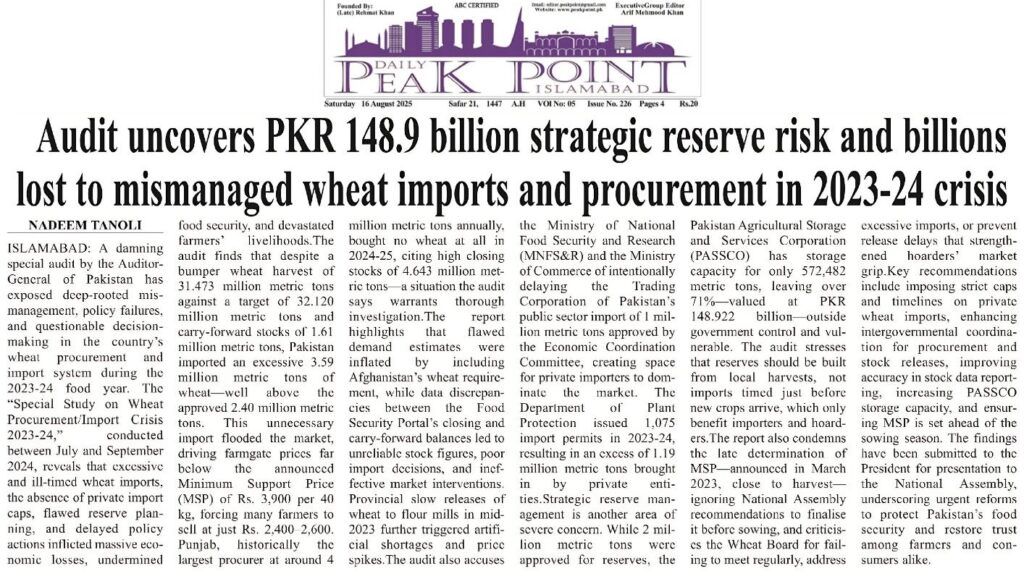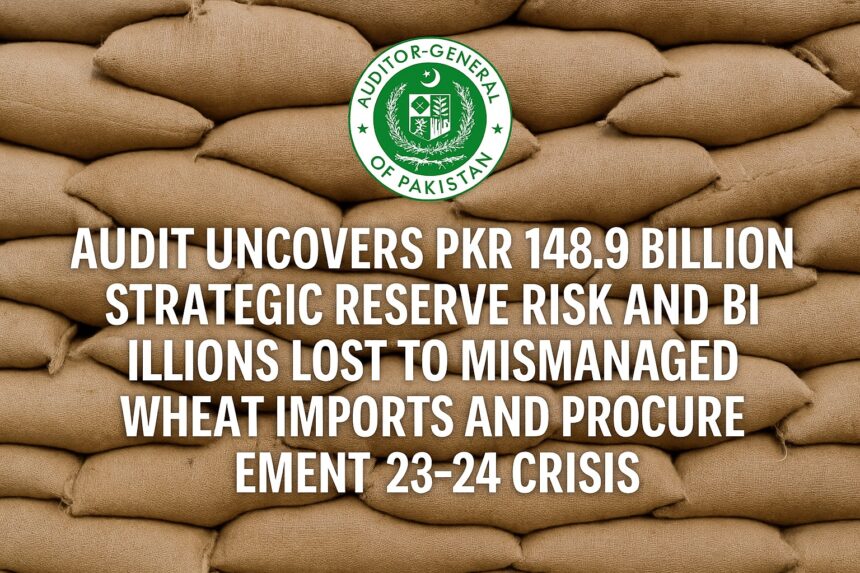Audit Uncovers PKR 148.9 Billion Strategic Reserve Risk and Billions Lost to Mismanaged Wheat Imports and Procurement in 2023-24 Crisis
Nadeem Tanoli
Islamabad: A damning special audit by the Auditor-General of Pakistan has exposed deep-rooted mismanagement, policy failures, and questionable decision-making in the country’s wheat procurement and import system during the 2023-24 food year. The “Special Study on Wheat Procurement/Import Crisis 2023-24,” conducted between July and September 2024, reveals that excessive and ill-timed wheat imports, the absence of private import caps, flawed reserve planning, and delayed policy actions inflicted massive economic losses, undermined food security, and devastated farmers’ livelihoods.
The audit finds that despite a bumper wheat harvest of 31.473 million metric tons against a target of 32.120 million metric tons and carry-forward stocks of 1.61 million metric tons, Pakistan imported an excessive 3.59 million metric tons of wheat—well above the approved 2.40 million metric tons. This unnecessary import flooded the market, driving farmgate prices far below the announced Minimum Support Price (MSP) of Rs. 3,900 per 40 kg, forcing many farmers to sell at just Rs. 2,400–2,600. Punjab, historically the largest procurer at around 4 million metric tons annually, bought no wheat at all in 2024-25, citing high closing stocks of 4.643 million metric tons—a situation the audit says warrants thorough investigation.
The report highlights that flawed demand estimates were inflated by including Afghanistan’s wheat requirement, while data discrepancies between the Food Security Portal’s closing and carry-forward balances led to unreliable stock figures, poor import decisions, and ineffective market interventions. Provincial slow releases of wheat to flour mills in mid-2023 further triggered artificial shortages and price spikes.
The audit also accuses the Ministry of National Food Security and Research (MNFS&R) and the Ministry of Commerce of intentionally delaying the Trading Corporation of Pakistan’s public sector import of 1 million metric tons approved by the Economic Coordination Committee, creating space for private importers to dominate the market. The Department of Plant Protection issued 1,075 import permits in 2023-24, resulting in an excess of 1.19 million metric tons brought in by private entities.
Strategic reserve management is another area of severe concern. While 2 million metric tons were approved for reserves, the Pakistan Agricultural Storage and Services Corporation (PASSCO) has storage capacity for only 572,482 metric tons, leaving over 71%—valued at PKR 148.922 billion—outside government control and vulnerable. The audit stresses that reserves should be built from local harvests, not imports timed just before new crops arrive, which only benefit importers and hoarders.
The report also condemns the late determination of MSP—announced in March 2023, close to harvest—ignoring National Assembly recommendations to finalise it before sowing, and criticises the Wheat Board for failing to meet regularly, address excessive imports, or prevent release delays that strengthened hoarders’ market grip.
Key recommendations include imposing strict caps and timelines on private wheat imports, enhancing intergovernmental coordination for procurement and stock releases, improving accuracy in stock data reporting, increasing PASSCO storage capacity, and ensuring MSP is set ahead of the sowing season. The findings have been submitted to the President for presentation to the National Assembly, underscoring urgent reforms to protect Pakistan’s food security and restore trust among farmers and consumers alike.
News Link: Audit finds PKR 148.9b risk, wheat losses – Minute Mirror













